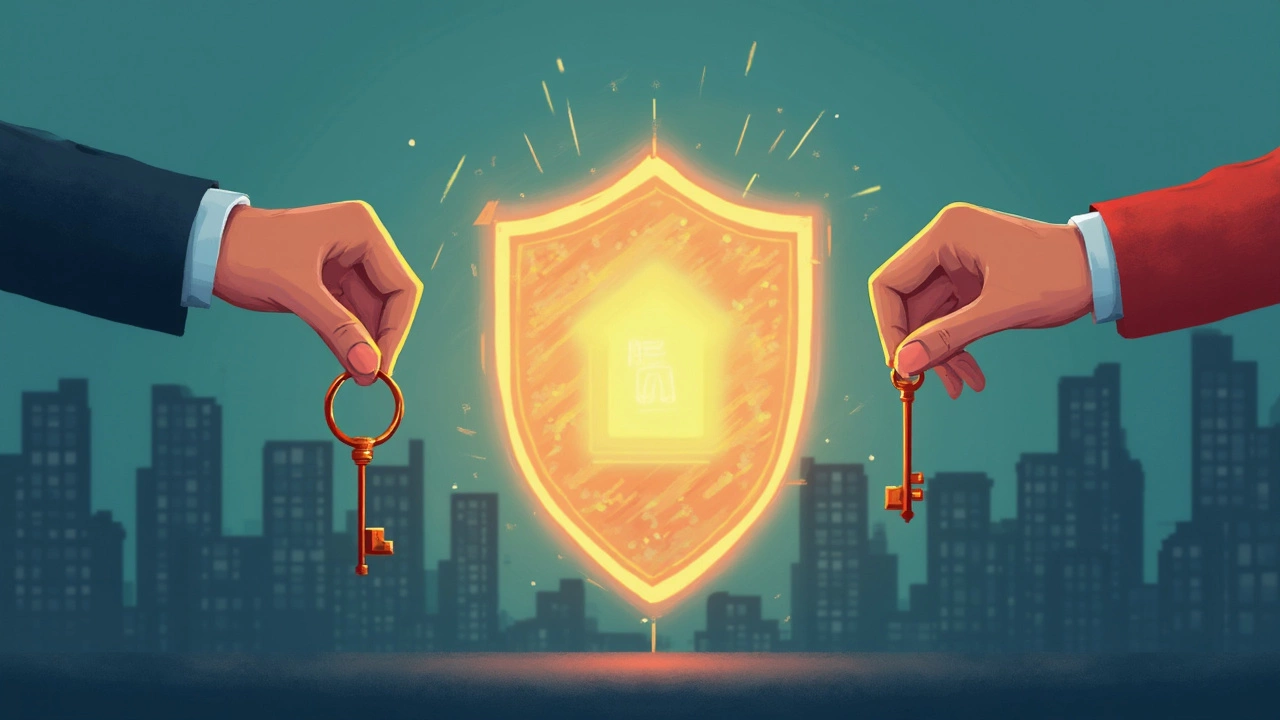Worried your landlord might have a spare key to your place? You’re not the only one—the question comes up way more than you’d think in India’s rental world. Privacy is a big deal, but so are emergencies. Let’s get straight to the basics. In India, there’s no single law that spells out whether a landlord can hold on to a spare key, but tenant privacy is protected under several court rulings and general principles of tenancy law.
So, does your landlord get to drop by with their secret key whenever they want? Not so fast. A landlord can't just walk in or use a spare key unless there’s a real emergency, like a fire, water leak, or a suspected break-in. If they ignore this and let themselves in without warning, it’s not just rude—it's technically trespassing, and you have the right to call them out on it.
- What Indian Law Says About Spare Keys
- When Can a Landlord Legally Enter?
- Real-Life Scenarios and Disputes
- Tips for Handling Key and Access Issues
What Indian Law Says About Spare Keys
The first thing to know—there’s no one-size-fits-all law that spells out whether a landlord spare key in India is legal or illegal. Indian tenancy rules are mostly set out in the Rent Control Acts, and these vary depending on which state you live in. But all across the board, your right to privacy gets a lot of weight. Courts have supported the idea that a tenant’s home can’t just be entered like it’s a public park, no matter who owns it.
Nowhere in these laws does it say a landlord must—or must not—keep a spare key. Instead, it’s all about what’s agreed upon in the rental agreement. Some agreements mention handing over all keys; others might say the owner keeps a spare for emergencies. If it’s written down and both parties signed, that stands. If nothing’s mentioned, assume the landlord shouldn’t be entering at will.
The Supreme Court has even pointed out that unauthorized entry into an occupied house—yes, even with a key—can count as trespass. That means your tenant rights win if the landlord lets himself in without asking. States like Maharashtra, Karnataka, and Delhi make it clear in their rent acts that landlords are supposed to give reasonable notice before showing up for inspections or repairs.
Here’s where things get tricky: emergencies. If there’s a fire, major leak, or break-in, a landlord can step in to protect their property. But for everything else, you’re in control of who walks through your door, key or not.
- Want full peace of mind? When you move in, ask for a written mention in your agreement about spare keys and landlord access.
- Not sure what’s normal? Check your state’s Rent Control Act online. The language may be old-school, but it’ll give you a baseline.
- If you find your landlord entering without notice, document it. The law is usually on your side.
One more interesting thing: A 2023 survey of over 1,000 tenants in urban India showed that nearly 46% didn’t know their rights regarding landlord access and spare keys. So, if you’re unsure, don’t sweat—you’ve got company. But the more you know, the less likely you’ll find yourself in an awkward (or unlawful) situation over a hidden spare.
When Can a Landlord Legally Enter?
This is where things get serious for both tenants and landlords in India. Laws aren’t super strict or detailed, but tenant privacy is protected by general property rules and court decisions. In short, even if your landlord spare key India question keeps you up at night, it’s not as scary as it sounds—landlords can't just barge in whenever they like.
Here’s what’s clear: a landlord legally entering your home without your okay is usually not acceptable. But there are some genuine situations where access makes sense. These are pretty much the only times a landlord should use a key or enter your place:
- Written Notice: For routine checks, repairs, or showing the place to future tenants, the landlord must give reasonable notice—many rental agreements mention 24-hour notice. Verbal warnings don’t cut it. Make sure to get this in writing.
- Emergencies: If something’s on fire, there’s a flood, a gas leak, or someone’s life is in immediate danger, the landlord can go in. This is standard in most cities, even though it’s not written in one nationwide law.
- Tenant’s Request: If you ask for repairs or help, then you’re allowing entry. But this doesn’t give them a free pass anytime after that.
Courts in India have actually sided with tenants in plenty of cases where landlords tried to push their luck and entered without a good reason. A pretty useful tip: always check your lease. If it doesn’t mention anything about key access or written notice, get it sorted before signing.
Want some numbers for context? A 2023 survey by LegalDesk found that 65% of tenants in major Indian cities dealt with landlords entering without permission. That’s not okay by any stretch of rental law.
| Scenario | Landlord Entry Allowed? |
|---|---|
| Emergency (fire, flood, health risk) | Yes |
| Routine inspection with written notice | Yes |
| Random drop-in without notice | No |
| Regular repairs with notice | Yes |
So, if you come home and your landlord’s inside fixing the sink but never told you—they’re stepping over the line. Your space, your rules, unless it’s urgent.

Real-Life Scenarios and Disputes
It’s one thing to know the rules, but the real test comes when landlord spare key India issues pop up in actual situations. Let’s look at what usually happens.
Plenty of tenants in cities like Mumbai, Bangalore, or Delhi have reported cases where the landlord used a spare key to enter their flat without warning. In some high-profile cases—such as a 2022 dispute in Pune—tenants filed police complaints after finding landlords snooping around their rooms while they were out. The complaints often led to legal warnings or, at the very least, nasty arguments that never really fixed the trust issues.
Most people don’t know that Section 441 of the Indian Penal Code actually covers trespassing in rented properties. If a landlord uses a spare key and shows up unannounced, it isn’t just annoying—it can be a criminal offence. Local police in Tier 1 cities see dozens of complaints every month about this, usually citing unauthorized access or privacy violations. A 2023 survey by a leading Indian property site found that 28% of young tenants have had a landlord enter their place without notice at least once.
Common disputes over landlord access and spare keys often boil down to these situations:
- Emergency entry: Tenants usually don’t mind if the landlord comes in to fix a sudden water leak or electrical short circuit—but only if they find out afterward or get a quick call before the entry.
- Random inspections: Landlords sometimes use spare keys for surprise checks. This is where tensions flare up, especially if personal belongings are disturbed.
- Maintenance gone wrong: Scheduled repairs that happen when the tenant is away can lead to misunderstandings, especially if the landlord doesn’t send a message or use video calls to update the tenant.
If you ever face any of this, keep records—chats, call logs, and even neighbours’ statements. They help if things go south and you need to involve the police or a lawyer. Remember, privacy isn’t just a courtesy. Under tenant rights in India, it’s your legal right.
Tips for Handling Key and Access Issues
No one likes surprises in their own home, so let’s talk about ways to make the whole landlord spare key India situation more manageable—without drama. If you’re worried about privacy or confrontations, a few steps can seriously help.
- Check Your Rental Agreement: Dig out your rental agreement and look for any mention of keys and access. Most agreements in India don’t say much about spare keys, but if yours does, follow those rules. If it’s unclear, ask your landlord to add a clear clause about key rights before signing the next time.
- Ask for Written Notice: The law says a landlord can only enter after giving “reasonable notice”—usually 24 hours unless it’s an emergency. If your landlord insists on entry, ask them to message or write you first. This keeps everything above board.
- Offer a Sealed Spare Key: Some tenants compromise by giving the landlord a spare key in a sealed envelope, signed across the seal. The rule is simple: if the seal’s broken without your knowledge, ask for an explanation right away.
- Change the Locks If Needed: If you feel your privacy is being invaded, you can change the locks. Tell your landlord about it and offer them access for emergencies if you feel comfortable. Technically, you’re not supposed to change locks without telling your landlord, but there’s no direct law stopping you either—just don’t leave them out of the loop.
- Keep Communication Open: When stuff goes wrong—like the landlord letting themselves in—talk it out first. Most situations get sorted if you clearly state your boundaries.
Here’s a quick look at what the law expects in common scenarios:
| Situation | What Law Says | What You Can Do |
|---|---|---|
| Regular landlord visits without notice | Usually not allowed | Ask for notice or report trespass (IPC Section 441) |
| Landlord keeps a spare key, enters during emergency | Permitted if it’s urgent (fire, water leak etc.) | Should inform tenant ASAP |
| Landlord enters for repairs/inspection | Allowed with notice | 24-hour notice is standard |
Bottom line—don’t be shy about asking questions or drawing the line on tenant rights. If things go off the rails, you can complain to the local police or take the matter to the Rent Control Authority. Just remember, clear rules and open talk with your landlord often keep the key drama pretty chill.
